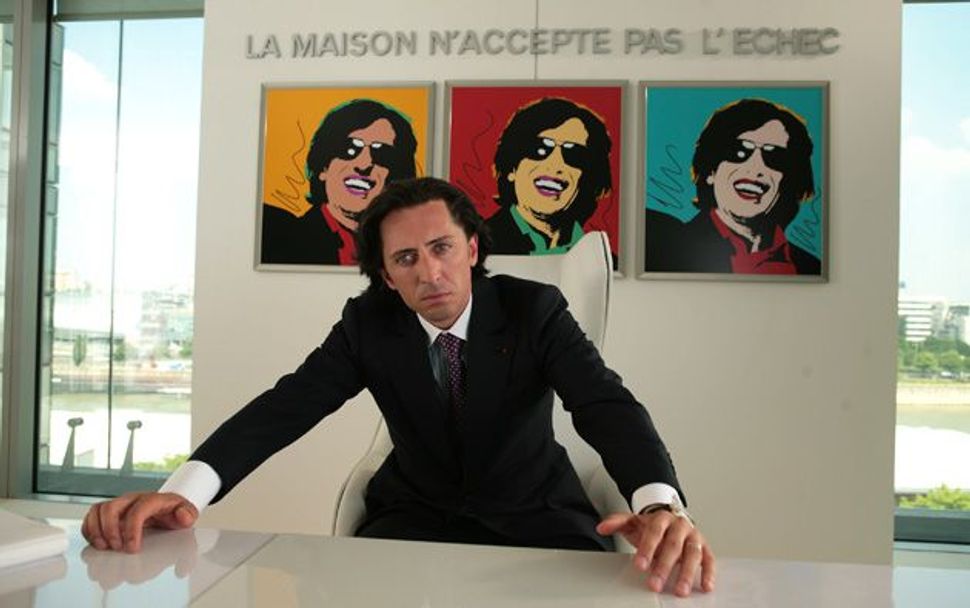Gadding About

Self-made Man: Coco supposedly made his millions by marketing ?eau frétillante? (?quivering? or ?wiggling water,? a pun on the common term for seltzer, ?eau pétillante?). Image by COURTESY LEGENDE FILMS
Thirty-eight-year-old French-Moroccan Jewish comedian Gad Elmaleh is well on his way to global stardom. His latest film, “Coco,” which opened in Paris last March, is a huge box office hit, and Elmaleh earns kudos not only as an actor, but as writer and director, too.
He stars as the title character, a nouveau riche North African Jewish immigrant who goes overboard planning his son’s lavish bar mitzvah and winds up with a heart condition (his cardiologist is played gleefully by Gérard Depardieu). At the reception, the clueless whirlwind Coco gauchely orders “scotch on the rocks without any ice.”
The character’s frenzied determination to make the family bar mitzvah into a “national event of the year” eventually repels his entire mishpocha, until Coco finally experiences what Elmaleh calls a “moment of truth about his role as a father.”
Paternal roles and lessons are a key part of Elmaleh’s success and of his Jewishness. His latest touring standup comedy show is called “Papa Is Upstairs, ” (“Papa est en Haut”), ironically inspired by a line from a traditional French lullaby, “Fais do do” (“Beddy-bye”), since his routines, centering on comically incoherent, choleric parents, have no elements of cozy beddy-bye songs and, in fact, explode cozy domestic stereotypes. Yet, his own expanding career is an expression of serious family consciousness. Elmaleh’s late grandfather Yehuda was an amateur humorist in Casablanca, noted for his imitations, while Elmaleh’s father, a shopkeeper, was an amateur mime. Small wonder Elmaleh finds comedy within familial tradition.
Largely to please his young son, Elmaleh reprised the Jerry Seinfeld role for the French release of “Bee Movie” (titled “Drôle d’Abeille” or “Odd Bee. ” for the Gallic audience). More recently, he flew to Hollywood to record English dialogue for another film sure to please his son — Steven Spielberg’s “The Adventures of Tintin: Secret of the Unicorn,” to be released next year. Elmaleh, who plays the role of a villainous merchant named Ben Salaad, explained how Spielberg, whom he idolizes as the director of “Schindler’s List,” was a daunting paternal image for him before shooting on the new film began. On a TV talk show hosted by Michel Drucker, a French-Jewish version of Merv Griffin, Elmaleh recalls how he painfully memorized his English dialogue, only to find on the day of shooting in Hollywood that it all had been rewritten. Elmaleh found Spielberg to be astonishingly sympathetic and conciliatory, willing to readjust the dialogue to make it as close as possible to what he had previously memorized. With giddy pride, Elmaleh recounts how, after one take, Spielberg even blew him a kiss.
Elmaleh’s newest project, currently filming in France, offers fewer kisses. “La Rafle” (“The Roundup”), written and directed by Roselyne Bosch, is a historical film about the notorious July 1942 Rafle du Vel’ d’Hiv, the largest mass arrest of French Jews during the Second World War. More than 13,000 Jews were sent to the Vélodrome d’Hiver, a building that housed a winter bicycle track, and thence deported to Auschwitz. Elmaleh plays Schmuel Weisman, a family man who has his hands full with a brood of three children, ranging in age from 10 to 13: Joseph, Charlotte and Rachel. “La Rafle” will be produced by Alain Goldman, Elmaleh’s co-producer on “Coco.” Somewhat curiously, Goldman is also named in certain production credits as “Ilan Goldman,” according to his official biography, “depending on the film.”
Multiple identities seem to be no problem for Elmaleh, who, despite the ludicrous and even outrageous characters he joyously incarnates on TV and in films, has long shown a serious side to his wit. In quieter moments of TV interviews, Elmaleh is low-key and soft-spoken, expressing his attachment toward his native Morocco, as well as to Israel, in a recent issue of the French-Israeli magazine Guide SVP-Israël. He informs the interviewer that he relishes visits to Tel Aviv, where he enjoys hanging out at the trendy upscale Italian restaurant Cantina, on Rothschild Boulevard. Elmaleh also pops into sample shows and standup comedy in Tel Aviv by performers “whose perspective and self-derision stupefy me. Their texts and wicked humor go very far, much farther than French Jewish humorists do! If we dared say one-tenth of what [Tel Aviv’s comedians] say, our French audiences would be shocked… which proves that Israeli society, if only through the creatively acerbic outlook of its performers, is very healthy, balanced and lively.”
“I was profoundly influenced by Moroccan-Jewish values,” he further informs the same interviewer, adding that he celebrates the Sabbath with his own parents as often as possible, so that his 7-year-old son can absorb tradition and history.
A tragic part of that history, the subject of the Vel d’Hiv, has hitherto been limited to French historical documentaries and the Kafkaesque symbolic film “Mr. Klein” (1976), starring Alain Delon and directed by Joseph Losey. Roselyne Bosch is best remembered for writing the screenplay for Ridley Scott’s “1492: Conquest of Paradise” (1992), in which Depardieu played Christopher Columbus, so he has some credentials for delving into history for dramatic effect. Elmaleh, if he is subtly directed, should avoid unfortunate precedents of other comedians dealing awkwardly with the Shoah, like Roberto Benigni in 1997’s overpraised “Life Is Beautiful” and Jerry Lewis in 1972’s abortive “The Day the Clown Cried.” Elmaleh, who is as graceful in his high seriousness as in low comedy, should prove to be the exception to this series of misbegotten efforts.
Benjamin Ivry is a frequent contributor to the Forward.
















